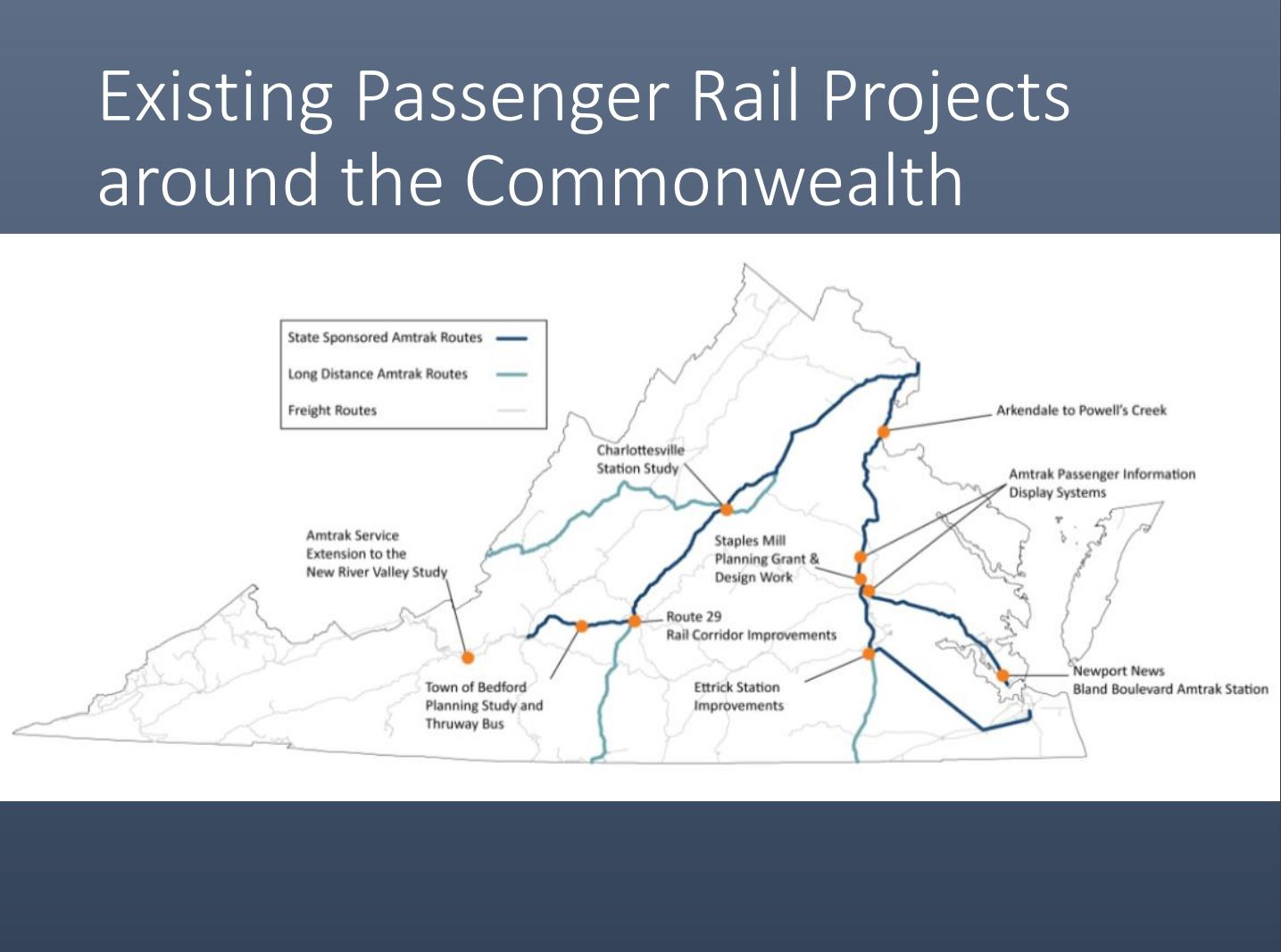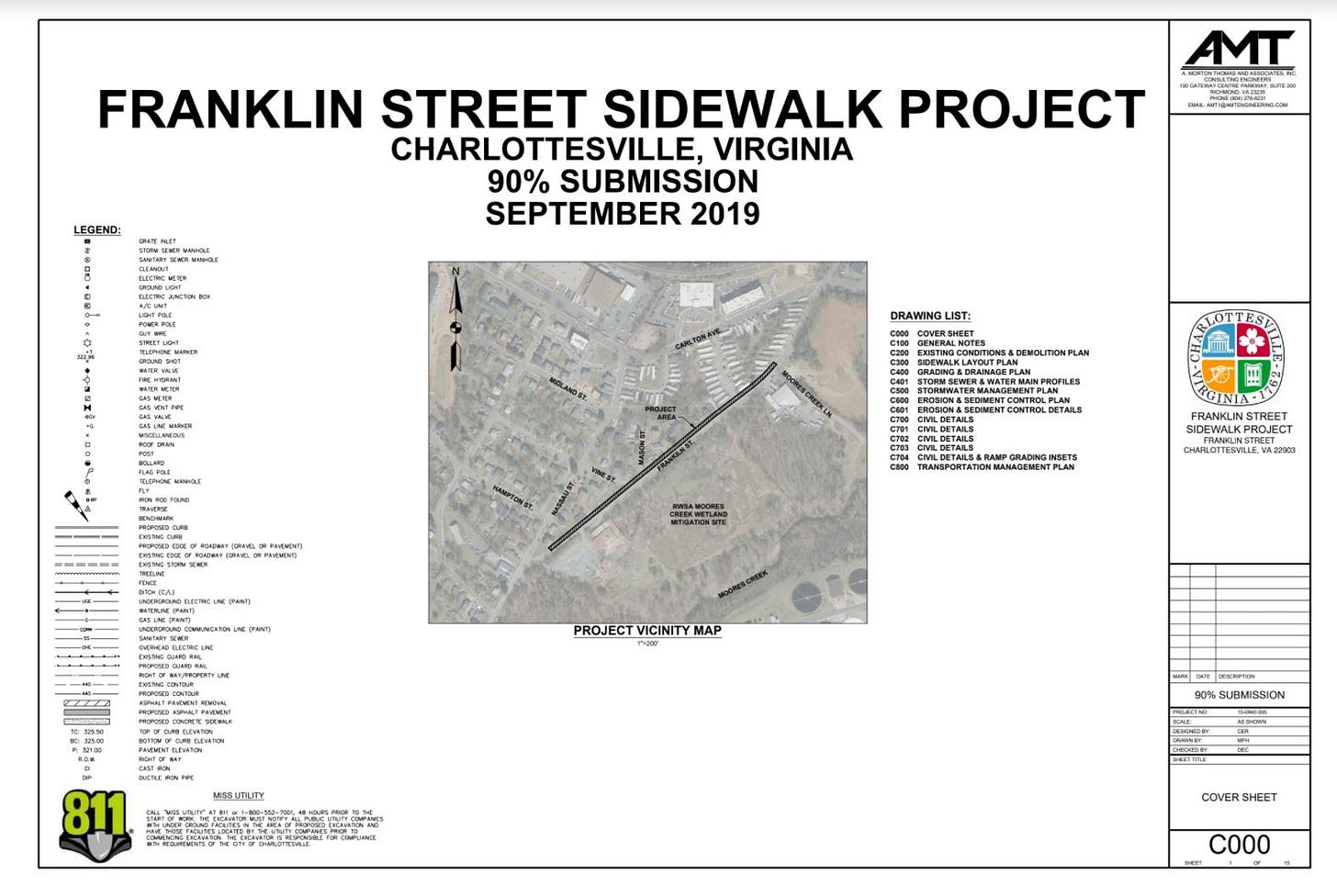In today’s Patreon-fueled shout-out, supporter Lonnie Murray wants you to know about a series of seminars on spring and fall landscaping with native plants. Plant Virginia Natives has held four of these already, but the next one is coming up on April 20 with Beth Mizell of Blue Ridge Prism on how to identify and eradicate invasive plants in Virginia.
On today’s show:
Charlottesville’s registrar has resigned, effective immediately
Virginia’s purchase of CSX rail lines in Virginia moves forward
A look at why the Franklin Street sidewalk project stalled and how it can get back on track
A quarter of Virginians are now fully vaccinated
Today is only the second time this year that the number of new COVID-19 cases has dipped below 1,000 with 978 reported today by the Virginia Department of Health. The seven-day average is 1,464 a day and the percent positivity is at 6.1 percent. As of today, one-fourth of Virginians are fully vaccinated.
Governor Ralph Northam appeared this afternoon at the opening of a new mass vaccination clinic in Fairfax County.
“Over the past four months we have made tremendous progress vaccinating Virginians against the COVID-19 virus,” Northam said. “This has been a very tough year for everyone.”
As of this weekend, everyone over the age of 16 is eligible to sign up for an appointment at vaccinate.virginia.gov.
“Not everyone can get a shot today or even this week,” Northam said. “And while demand still outstrips supply, our supply is much larger than it used to be.”
Northam did not have many changes to the current restrictions, but there were a few specific amendments.
“Cross country will be allowed to have 68 runners at the starting lines, which is up from 50,” Northam said. “Performance events like drama and musicals are considered social gatherings. I’ve heard a lot of feedback from parents and students that these events should be treated the same as athletic events, and I agree. So we’ll increase the number of people to 100 indoors or thirty percent of that venue’s capacity. If it it’s outdoors it will be increased to 500 or 30 percent.”
This past weekend, the Virginia Department of Health reported the presence of the P.1 variant in the Commonwealth. Northam said people in the state should remain vigilant.
Last week, Pfizer announced it is likely a third shot will be required within 12 months. Dr. Costi Sifri is the director of hospital epidemiology at the University of Virginia, and he spoke at a media briefing on April 16.
“I think that there is a very good chance that Moderna may need to have a booster if it appears that Pfizer does as well at 12 months but I think we’ll just have to follow the science and I know that Moderna will be doing those studies,” Dr. Sifri said. “I think we’ve always anticipated that a booster could be needed but not for durability of immunity but also for potentially to be able to address the rise of variants.”
Dr. Sifri said that while the number of cases of clotting with the Johnson and Johnson vaccine is small, he supports the pause as a precaution.
“The pause is a reasonable and important thing to do to understand the biology of it, but even if proves out to be caused by this vaccine, it’s going to be a rare, rare event and far outweighed by COVID itself,” Dr. Sifri said.
The Centers for Disease Control is expected to meet this Friday to discuss next steps for the Johnson and Johnson vaccine, which was withdrawn from the supply due to reported incidents of blood clotting.
Railroad company CSX has closed the first transaction with the Commonwealth of Virginia for hundreds of miles of railway and right of way, according to a press release issued last week. The first of three phases in the $525 million exchange takes the form of a permanent land easement between Petersburg and Washington D.C. The other two phases are a line from Doswell to Clifton Forge, and another line from Petersburg to Ridgeway, North Carolina.
*
Charlottesville is looking for a new registrar. Last week, Melissa Morton notified the three-member Electoral Board of her resignation for personal reasons, according to the minutes of the Board’s April 12 meeting. The Board has approved Taylor Yowell to serve as acting registrar until a permanent replacement is found. Morton became the assistant registrar in 2014, and replaced Rosanna Bencoach who left the position in 2019 when the Board told her she would need to reapply for the position.
Albemarle County is requesting $1 million in Community Development Block Grant funds to help cover the $8.5 million cost to build 20 owner-occupied housing units in the first phase of the Southwood. That’s according to a public notice in today’s Daily Progress which announces that Albemarle County has made a ruling of Finding Of No Significant Impact, or a FONSI, on the human environment. The county is taking public comments on this through May 3. (Daily Progress public notice)
In this Substack-fueled public service announcement… are you of Scottish ancestry? The Albemarle Charlottesville Historical Society and the Jefferson-Madison Regional Library will hold another of their Ask A Genealogist series at 7 p.m. on Thursday, April 22. Special guest Deborah Harvey will demonstrate how she traced some of her ancestors from Fluvanna County to Scotland. Sign up at jmrl.org and email your questions to library@albemarlehistory.org before the virtual event.
Earlier this year, City Council agreed to transfer federal funding that had been allocated to add a sidewalk on Franklin Street, which serves as part of its eastern border with Albemarle County. The project was within the jurisdiction of a task force that was put together to recommend projects eligible for Community Development Block Grant funding distributed by the U.S. Department of Housing and Urban Development, or HUD. Erin Atak is a grants coordinator with the city of Charlottesville.
“This is funding that’s issued by HUD,” Atak said. “These are federal funds that the city receives each year as an entitlement community.”
The city selects a neighborhood every three years to receive the money for infrastructure and a task force is put together to make recommendations to Council. One recent project funded through this process is a pocket park in the 10th and Neighborhood. The current neighborhood receiving funds is the Ridge Street neighborhood. The Belmont task force last met in February 12, 2019.
“And in this case, the Belmont Priority Neighborhood [Task Force] recommended to City Council the Franklin Street sidewalk which was approved to create a new sidewalk on the west side between north Moores Creek Lane and Nassau Street, which was approximately 1,600 feet of new sidewalk.”
This process is separate from the city’s sidewalk priority process. The Belmont neighborhood was allocated a total of $449,214 and the sidewalk made up a portion of that amount.
Tim Motsch is a transportation project manager with the city, hired in the summer of 2017.
“Myself and Kyle Kling were hired in order to manage transportation projects including the sidewalks which I have been involved in as well as Smart Scale projects that I’ve been involved in such as the East High Streetscape and the Emmet Streetscape.”
More on those projects in a future newsletter. For now, Motsch explained that design for the Frankin Street sidewalk began in late 2018 when the engineering firm A. Morton Thomas was hired to do the work. Complications happened.
“It is a challenging plan from the point of the view of stormwater management depending on which map you look at and which datum you refer to, the sidewalk is either right next to the floodplain or in the floodplain,” Motsch said.
That delayed the design for the project, which included the need to purchase easements from landowners on which mitigating features and drainafe could be built. The pandemic’s effect on the city’s budget also led to a delay.
“Add to the fact that last year, for several months all sidewalk projects were on hold due to the possibility of having to use city funds,” Motsch said.
Construction is now slated for next spring, but that’s if the right of way can be acquired from around a dozen property owners.
However, Atak explained that HUD has time limits by which its money can be spent and this project did not make the deadline.
“Normally funds are required to be spent within one year of receiving CDBG dollars,” Atak said.
In February, Council transferred the funding to a rent relief initiative for public housing, but Atak said the funding will be restored on July 1, 2022. Everything has to be in place for the project to move forward.
“It’s very important that we receive public support with the right of way moving forward so that we can secure this funding and there aren’t any delays moving forward,” Atak said.
Atak said HUD has already issued a warning on the project.
Motsch said a round of certified letters are being sent out to property owners this week for negotiations, and that the city wants to avoid taking properties by condemnation. One of the abutting landowners is Sunshine Court, which owns a six and a half acre mobile home park on Carlton Avenue. The property has a land value of $2.4 million.

















Share this post